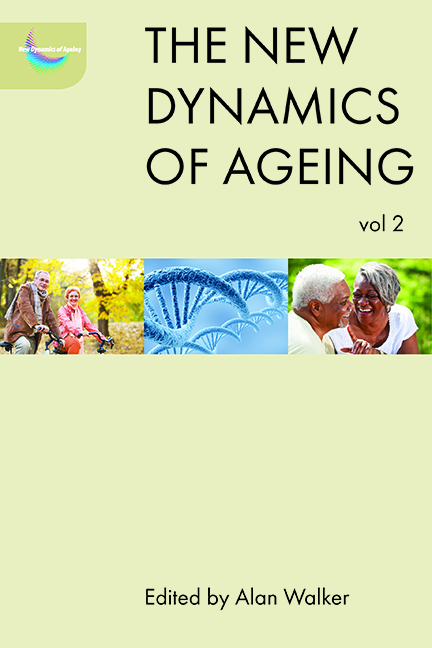fifteen - The place of theatre in representations of ageing
Published online by Cambridge University Press: 13 April 2022
Summary
Prologue
The interdisciplinary ‘Ages and Stages’ project, funded initially under the New Dynamics of Ageing (NDA) programme, has evolved into a continuing collaboration between Keele University and the New Vic Theatre, Newcastle-under-Lyme. The first ‘Ages and Stages’ project (2009–12) examined historical representations of ageing within the Vic's ground-breaking documentaries and docudramas (produced between 1964 and 1995), and explored the contemporary recollections and experiences of older people who are, or have been, associated with the theatre in different ways. Archival and interview material was drawn together to create the ‘Ages and Stages’ exhibition and a new, hour-long, documentary drama, ‘Our Age, Our Stage’. Between 2012 and 2013, further funds were secured from the Arts and Humanities Research Council (AHRC) follow-on scheme to focus on translational work, and we were subsequently awarded two additional grants by the AHRC under their Cultural Value Project. In this chapter we concentrate on the first three-year project; readers interested in following through what we have done subsequently are invited to visit the ‘Ages and Stages’ and ‘Live Age Festival’ websites (www.keele.ac.uk/agesandstages and www.liveagefestival.co.uk).
Act One: Setting the scene
Social and critical gerontologists, as well as literary and cultural scholars, are increasingly interested in the artistic engagement of older people, and in how the arts may construct, perpetuate or challenge stereotypical views of old age and existing models of the ageing process (Gullette, 1997, 2004, 2011; Basting, 1998, 2009; Small, 2007; Lipscomb and Marshall, 2010; Mangan, 2013). While recent reviews (Cutler, 2009; Castora-Binkley et al, 2010; Mental Health Foundation, 2011; Noice et al, 2014) affirm the value of older people's engagement in cultural activities, they also point to a lack of research on theatre and drama more specifically. This is despite the fact that, as Lipscomb (2012) argues, theatre provides us with an untapped potential for interdisciplinary collaborations and investigations; it is a cultural arena in which both ageing and older people are highly visible as audience members, participants, characters and increasingly, as performers (Bernard and Munro, 2015).
In terms of representations, there is a long tradition of theatre drawing heavily on stereotypes of older people and on deficit models of the ageing process, extending back to early Greek tragedies (Charney, 2005; Robson, 2009).
- Type
- Chapter
- Information
- The New Dynamics of Ageing Volume 2 , pp. 285 - 306Publisher: Bristol University PressPrint publication year: 2018



